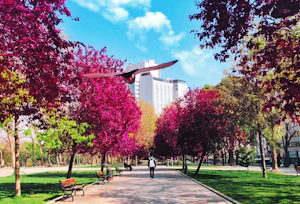Turkey's unique blend of Eastern and Western influences, combined with its rich history, makes it a fascinating country for expats. However, for those looking to integrate into and prosper in their new home, understanding the local culture is crucial. This guide offers insights into Turkish customs, language, cuisine, and events, providing a foundation for you to truly embrace life in Turkey. By delving into the intricacies of the culture, you'll foster smoother interpersonal interactions with the locals and forge strong connections, ultimately enhancing your experience as an expat.
One of the most critical aspects of any culture is its customs and etiquette. In Turkey, everyday customs may differ from what you're used to back home. By familiarizing yourself with these practices, you can better navigate different social situations, whether it's enjoying a meal with Turkish friends or attending a wedding. Moreover, the importance of learning the Turkish language cannot be overstated, as the ability to communicate with locals opens doors and fosters more profound connections.
Cuisine is another essential component of Turkish culture. With its vast array of flavors, fresh ingredients, and regional specialties, the culinary world in Turkey is a delight for the senses. Additionally, participating in cultural events and festivals enables you to deepen your appreciation for the country's vibrant and diverse traditions.
Nurturing connections with local individuals is vital for any expat looking to assimilate and truly call Turkey their home. Joining clubs and attending community gatherings can lead to fruitful relationships and enduring partnerships. Finally, the appreciation of Turkish art and music further immerses you in the culture, enriching your experiences and providing new perspectives.
Stay with us as we explore each aspect of Turkish culture, equipping you with the knowledge and inspiration needed to integrate and thrive in your new home.
Delving into Turkish Customs and Etiquette
- Greetings and Social Interactions: Greetings in Turkey generally consist of a firm handshake, accompanied by direct eye contact. Close friends and family often engage in more intimate greetings, such as a hug or cheek-kissing. When meeting someone for the first time, it's essential to address them with "Bey" (Mr.) or "Hanım" (Ms.) followed by their first name. Being respectful and using appropriate titles can go a long way in establishing positive relationships in Turkey.
- Dress Code: While Turkey is a predominantly Muslim country, the dress code varies between urban and rural areas. In metropolitan cities like Istanbul or Ankara, dressing somewhat conservatively is acceptable, but in rural or more conservative places, modest attire is advised. Wearing modest clothing, especially in religious settings, demonstrates respect for local customs and earns the appreciation of locals.
- Body Language and Personal Space: Turkish people often stand closer during conversations, with body language playing a significant role in communications. Maintaining eye contact is a sign of respect and trustworthiness. However, it's crucial not to engage in public displays of affection in more conservative areas, as these actions may be viewed as disrespectful.
Language Learning: Embracing the Turkish Language
Learning the Turkish language can open doors to a more profound connection with locals and a deeper understanding of the culture. A few strategies for mastering the language include:
- Language Schools: Enrolling in a language school provides structure, direction, and opportunities to practice with fellow students. Many language schools accommodate beginners and advanced learners, catering to various learning needs.
- Language Exchange Partners: Partnering with a local who is eager to learn your native language is another effective way to learn Turkish. Language exchange partners can assist with conversational skills and boost your cultural understanding.
- Mobile Apps and Online Resources: Language learning apps like Duolingo, Memrise, or Rosetta Stone facilitate Turkish language acquisition through interactive lessons and activities. Additionally, online resources such as TurkishClass101 and iTalki enable you to access structured courses and find native speakers for practice.
Discovering Turkish Cuisine: A Culinary Wonderland
Turkish cuisine, with its tantalizing flavors and regional specialties, is a joy for any food enthusiast. As an expat in Turkey, you're in for a treat. A few must-try dishes include:
- Kebabs: A Turkish classic, kebabs are skewered, grilled meat dishes, with regional favorites like Adana, Urfa, and Çökertme kebabs.
- Meze Platters: Meze is an appetizing assortment of small dishes, usually enjoyed as a shared social experience. Common items include hummus, stuffed vine leaves, tabbouleh, and baba ghanoush.
- Pide: Often referred to as "Turkish pizza," pide is a boat-shaped dough filled with ingredients like cheese, meats, and vegetables.
- Baklava: This sweet delight of thin filo pastry, filled with chopped nuts and syrup, is a must-try dessert. Gaziantep, a southeastern city in Turkey, is famous for its authentic and mouth-watering baklava.
Participating in Cultural Events and Festivals
Turkey hosts numerous exciting events that display the country's rich cultural tapestry. Attending these festivals allows expats to immerse themselves in traditional customs and celebrations. Some notable events include:
- International Istanbul Film Festival: Held in April, this prestigious film festival showcases films from Turkey and around the world, attracting cinephiles and industry professionals alike.
- The Whirling Dervishes Festival: Each December, Konya hosts the mesmerizing Whirling Dervishes Festival in memory of the great Sufi poet, Rumi. This spiritual experience is not to be missed.
- Traditional Oil Wrestling: Edirne's annual oil wrestling competition, known as Kirkpinar, traces its history back 654 years. Join thousands of spectators to witness this fascinating event, typically held in June or July.
Conclusion
To truly thrive as an expat in Turkey, embracing Turkish culture is essential. Familiarizing yourself with the customs, etiquette, language, and cuisine while participating in events and nurturing local connections enhances your overall experience in your new home.
By taking the time to understand and respect the culture, you pave the way for more meaningful interactions, friendships, and memories. As you navigate the complexities of expat life in Turkey, be open to the beauty of its culture and let it enhance the tapestry of your journey.
Ikamet is your go-to source for any expat seeking advice, information, and a supportive community of fellow expats in Turkey. For more insights, guides, and firsthand stories, be sure to bookmark our website and subscribe to our newsletter. Together, we'll help you navigate the enchanting Turkish landscape and make the most of your expat experience.













Member discussion